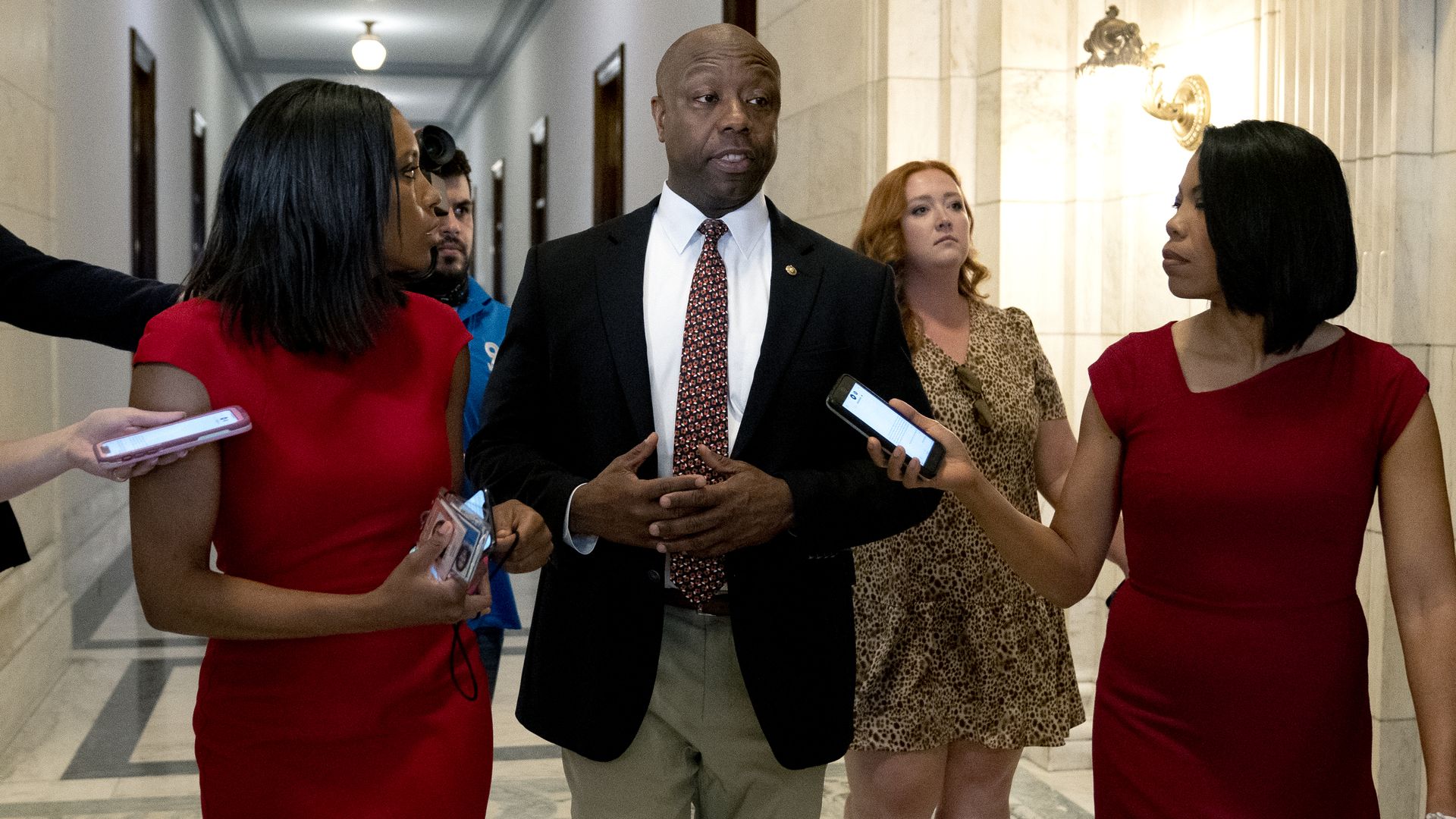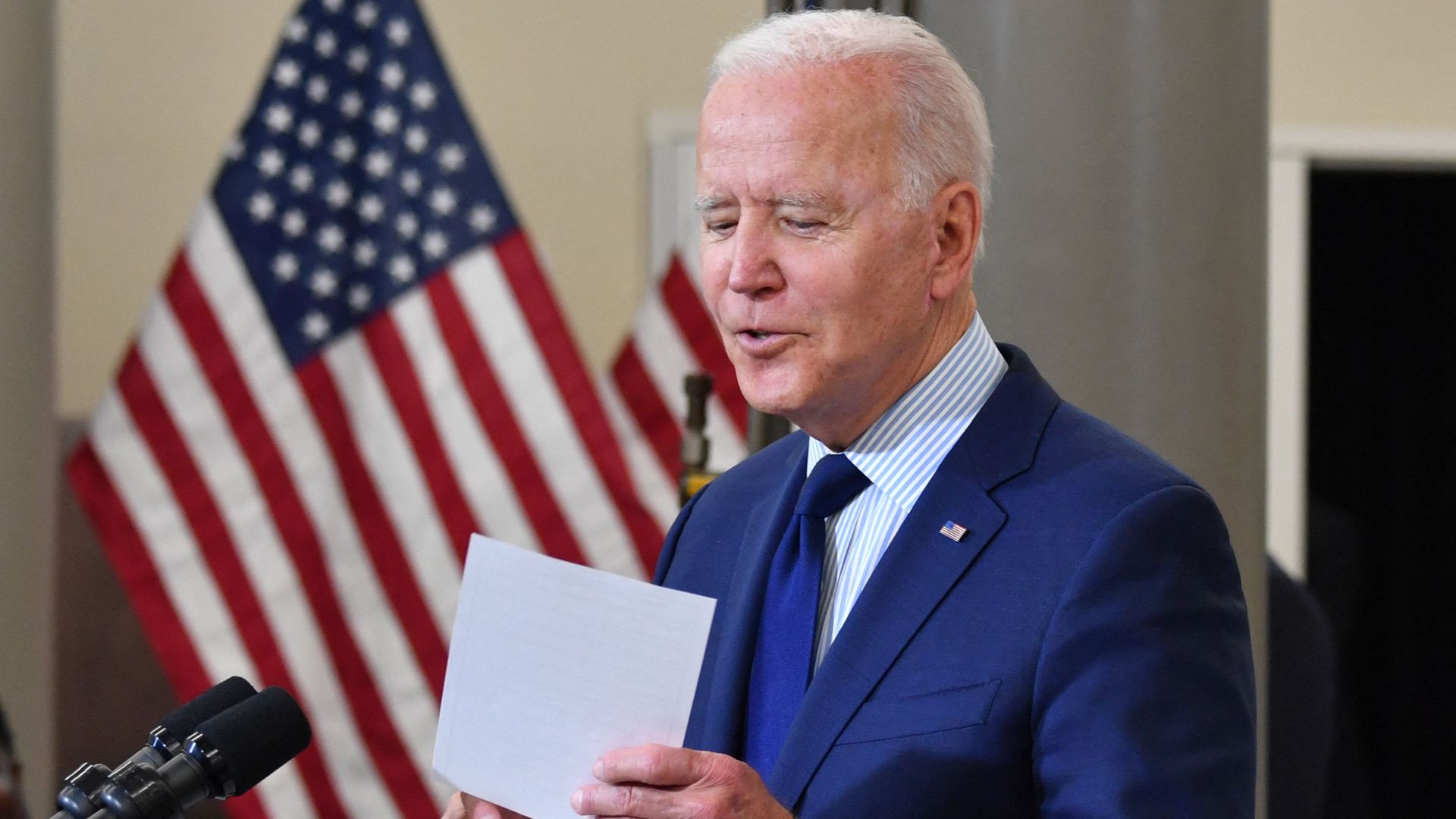| | | | | | | Presented By Facebook | | | | Axios Sneak Peek | | By Alayna Treene and Hans Nichols ·May 27, 2021 | | Welcome back to Sneak. The political pressure builds before everyone blows This Town tomorrow. ⚡ Situational awareness: Secretary of State Antony Blinken warned Israeli leaders evictions of Palestinian families from East Jerusalem or further unrest on the Temple Mount could spark renewed "tension, conflict and war," Axios from Tel Aviv author Barak Ravid reported today. Today's newsletter — edited by Glen Johnson — is 1,499 words, a 5.5-minute read. | | | | | | 1 big thing: Missed deadlines hint at long congressional summer |  | | | Sen. Tim Scott. Photo: Stefani Reynolds/Bloomberg via Getty Images | | | | Deadlines are hard to keep in a 50-50 Senate. Driving the news: Members are gearing up to leave town tomorrow for a weeklong recess, having missed nearly every deadline they set for some of President Biden's biggest legislative priorities. The chamber's precarious balance of power is a big reason. The state of play: The White House had wanted substantive proposals on police reform and infrastructure completed by the Memorial Day holiday weekend. Neither has happened. Infrastructure: Democrats and Republicans still seem as far apart as ever on a bipartisan infrastructure bill, despite some GOP senators sending a new counteroffer to the White House today. - The two sides still don't even agree on the definition of infrastructure — with Republicans seeking to limit it to "hard" infrastructure, such as improving roads, ports and bridges, while the White House includes big increases for climate initiatives and child care.
Police reform: During his joint address to Congress, Biden set a goal of completing police reform legislation by Wednesday — the one-year mark since George Floyd's death. - With that deadline now in the rearview mirror, top congressional negotiators are saying — as Sen. Tim Scott (R-S.C.) put it — it's "June or bust" to get it done.
Jan. 6 commission: While it looks like the Senate could still vote at some point tonight on whether to set up a 9/11-style commission to investigate the Capitol insurrection, the measure is likely to fail, bringing lawmakers back to square one on how to move forward. - House Speaker Nancy Pelosi (D-Calif.) has several options she can invoke on her own, including setting up a select commission — but it almost certainly won't be bipartisan.
Schumer's China bill: Senate Majority Leader Chuck Schumer (D-N.Y.) was supposed to get his vote on his China-focused global competition bill before senators jet out of town for recess, but both parties are still haggling over final details. - "It's a big mess right now," Sen. John Thune (R-S.D.) told reporters in the Capitol tonight.
- Even this bipartisan measure — which has heavy GOP input — was not without its own drama.
- The bill has been held up for hours by Republicans who want to continue debating it. But Schumer is trying to force their hand.
- Many lawmakers were hoping it would pass, so they could point to the bill as proof they're actually getting things done in D.C. and can reach across the aisle.
The bottom line: With Memorial Day marking the unofficial start of summer, lawmakers have a lot of required legislating left before their typical August recess. - If this run-up to recess has shown anything, it's that reaching quick resolutions may be aspirational rather than achievable — unless Democrats decide to go it alone and try to force bills into law.
- "We're going to have to close this down soon," Biden said today when asked about the ongoing infrastructure negotiations.
Keep reading. |     | | | | | | 2. Labor secretary faces trouble up in Boston |  | | | Marty Walsh (right). Photo: Al Drago/Bloomberg via Getty Images | | | | A dispute about what Labor Secretary Marty Walsh knew or didn't know before he left Boston for Washington is now threatening one of Biden's more popular Cabinet members, Axios' Sarah Mucha reports. Why it matters: Rep. Seth Moulton (D-Mass.) has said Walsh should resign if he was aware of past domestic violence allegations facing the Boston police commissioner he appointed before resigning as mayor. Walsh has denied any knowledge, but sworn filings in court are challenging that claim. - Sen. Elizabeth Warren (D-Mass.), whose support could be vital to Walsh keeping his job, recently dodged a question about whether the secretary should resign if he were aware.
- The White House declined to comment, although Walsh has continued to be a prominent face for the administration at events and through travel.
The details: Shortly after Biden nominated him to be Labor secretary in January, Walsh picked Dennis White to run the city's police department. - The process was rushed and seen by some as a way to fill the job with a favored candidate before handing over the mayor's office.
- Two days later, The Boston Globe reported about past domestic violence allegations involving White.
- Walsh placed White on leave and ordered an independent investigation. A 19-page report detailed the allegations, as well as on-again, off-again support for the probe by the Walsh administration.
What they're saying: Walsh has vehemently denied any foreknowledge. - His supporters say he was duped by the former police commission, William Gross, for whom White served as deputy and who is his close friend.
- In a court filing this month, Gross swore under oath that he had informed Walsh of the allegations in 2014.
- Suffolk County District Attorney Rachel Rollins, who is being vetted as a potential U.S. attorney for eastern Massachusetts, told a Boston radio station this week that a sworn statement "has to trump somebody just saying, 'Yeah, that never happened.'"
Keep reading. |     | | | | | | 3. By the numbers: Federal spending keeps rising |  Biden will call for $6 trillion in government spending next year when he unveils his FY2022 budget Friday, as the New York Times first reported. The big picture: Annual government spending has been rising for years, but it spiked last year because of the nation's coronavirus recovery efforts, Axios' Stef Kight and Hans Nichols report. - Although the most recent OMB data estimated government spending to be $4.8 trillion in 2020, the federal government ended up spending $6.55 trillion when coronavirus relief measures were included, according to USAspending.gov.
By the numbers: Biden's first budget proposal includes his massive infrastructure and education and families plans. - If enacted, it would be the most sustained federal spending in more than 50 years and would drive the federal deficit to more than $1.3 trillion over the next 10 years, according to the Times.
|     | | | | | | A message from Facebook | | The internet has changed a lot since 1996 - internet regulations should too | | |  | | | | It's been 25 years since comprehensive internet regulations passed. See why we support updated regulations on key issues, including: - Protecting people's privacy.
- Enabling safe and easy data portability between platforms.
- Preventing election interference.
- Reforming Section 230.
| | | | | | 4. House Democrats attack GOP over bill members also oppose |  | | | Illustration: Annelise Capossela/Axios | | | | House Democrats are following the money in a series of new ads hitting Republican opponents of major drug price legislation —but the trail also leads back to their own members, Axios' Lachlan Markay reports. What's happening: The Democratic Congressional Campaign Committee is accusing House Republicans of doing the bidding of drug industry donors by opposing the bill. Unremarked upon are the House Democrats who've also received money from the industry — and whose opposition is seen as potentially fatal to the legislation. The big picture: The DCCC leveled the allegations in a new round of digital ads unveiled Tuesday. They take Republicans to task for opposing a bill that would effectively cap drug prices. - The campaign is a response to recent ads by the GOP-aligned American Action Network hitting Democrats for supporting the legislation. The group has received funding from the Pharmaceutical Research and Manufacturers of America, the drug industry's largest trade group.
- The DCCC pegged the line of attack to a recent report from the House Oversight Committee, which found the company AbbVie dramatically raised prices for a number of drugs while it hiked executive pay. AbbVie is also a high-dollar contributor to PhRMA.
- "Unlike Republicans," the DCCC declared in a news release on its new ads, "House Democrats aren't going to bow down to Big Pharma and will continue fighting to lower the costs of prescription drugs. "
Between the lines: The Democrats are not quite as united as that statement makes it sound. Ten members recently sent a letter to Pelosi expressing concerns about the drug pricing legislation as written. - Democrats currently have an eight-seat majority in the House, meaning 10 defections could doom the legislation.
- Of those 10 members, seven got contributions last cycle from PhRMA, according to Federal Election Commission records. Six received donations from AbbVie's political action committee.
- The DCCC did not respond to requests for comment about those donations in the context of its new ads.
Be smart: The pharmaceutical industry's D.C. presence is massive, and it gives handily to legislators of both parties. - That provides Democrats and Republicans with plenty of opportunities to knock the other side for cronyism.
- It also can leave colleagues vulnerable to friendly fire.
|     | | | | | | 5. Mexico's deadly, deadly campaign comes to a close |  | | | The bullet-riddled, armored campaign car of Guillermo Valencia, who's running for mayor of Morelia, Michoacán. He survived a May 8 attempt on his life. Photo: Enrique Castro/AFP via Getty Images | | | | At least 88 politicians have been killed in Mexico and more than 100 report they've been threatened or kidnapped in the run-up to next week's midterm elections, Russell Contreras reports as part of his Axios Latino newsletter produced in c0njunction with Marina E. Franco of Noticias Telemundo. Why it matters: This Mexican election cycle is already the second bloodiest ever. In 2018, about 140 people involved in politics were murdered. - A municipal candidate, Alma Barragán, was assassinated this past Tuesday during a campaign stop.
- Electoral violence, according to experts, comes from organized crime trying to eliminate candidates they think will challenge them or their business, and from politicians trying to get rid of rivals.
By the numbers: 75% of the assassinated politicians were opposition candidates running for state-level office, according to risk analysis firm Etellekt. The big picture: There are 21,000 local, state and federal offices in play on June 6, including the entire lower chamber of the federal Congress. - It's the highest number ever in Mexico.
|     | | | | | | 6. Pic du jour |  | | | Photo: Nicholas Kamm/AFP via Getty Images | | | | "Some people have no shame." — President Biden, holding a list of Republicans who voted against the COVID-19 stimulus law but have touted its benefits back home. |     | | | | | | A message from Facebook | | Why Facebook supports updated internet regulations | | |  | | | | 2021 is the 25th anniversary of the Telecommunications Act of 1996, the last major update to internet regulation. It's time for an update to set clear rules for addressing today's toughest challenges. See how we're taking action on key issues and why we support updated internet regulations. | | | | 🇺🇸🇺🇸🇺🇸 Thanks for reading! We'll be back Sunday evening. A reminder that your family, friends and colleagues can sign up for email delivery of this free newsletter through this link. |  | | The tool and templates you need for more engaging team updates. | | | | | | Axios thanks our partners for supporting our newsletters.
Sponsorship has no influence on editorial content. Axios, 3100 Clarendon Blvd, Suite 1300, Arlington VA 22201 | | | You received this email because you signed up for newsletters from Axios.
Change your preferences or unsubscribe here. | | | Was this email forwarded to you?
Sign up now to get Axios in your inbox. | | | | Follow Axios on social media:    | | | | | |










No comments:
Post a Comment